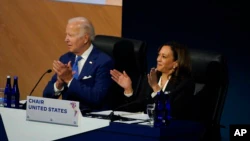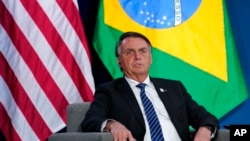U.S. President Joe Biden on Thursday presented his plan for nations in the Americas to tackle climate change while boosting clean energy production — a plan he’s touting as an economic boost that will bring lucrative jobs to nations that struggle to retain skilled workers amid migration flows in the hemisphere.
The Americas Partnership for Economic Prosperity, he said, “will tackle the climate crisis head on, with the same mentality we’re bringing to the work in the United States.
“When I hear ‘climate,’ I think jobs — good-paying, high-quality jobs that will help speed our transition to a green economy of the future and unleash sustainable growth; jobs in developing and deploying clean energy; jobs in decarbonizing the economy; jobs in protecting biodiversity of our hemisphere; jobs that will provide dignity of being able to feed your family, give your children a better life and envision a future of possibilities.”
Biden spoke in Los Angeles at the start of the Summit of the Americas, a gathering of 23 heads of state. The leaders of Mexico, Guatemala and Honduras boycotted the summit over objections that the United States did not invite Cuba, Nicaragua and Venezuela — countries that the U.S., as host, said didn’t deserve to attend because they are not democratic.
The climate plan involves steps to promote trade and investment in clean energy and encourage regional collaboration in Latin America and the Caribbean, administration officials told reporters Wednesday. They also announced the expansion of a United Nations and Inter-American Development Bank initiative to boost renewable energy sources by 2030.
The administration said it had secured a commitment of up to $50 billion from four regional development banks over the next five years.
On Wednesday, U.S. Vice President Kamala Harris announced a separate initiative, the U.S.-Caribbean Partnership to Address the Climate Crisis 2030. That plan focuses on reducing island nations’ dependence on energy imports.
But when asked what level of investment the U.S. would provide there, a senior administration official said, “That’s going to be a process, and we couldn’t, at this point, put a dollar figure on it.”
Bolsonaro’s position
Diego Abente Brun, director of the Latin American and Hemispheric Studies Program at George Washington University, told VOA that any climate proposal aimed at the Americas was likely to run headlong into a large obstacle: The president of the largest nation in South America, Brazil’s Jair Bolsonaro, is a noted climate skeptic. Other nations, such as Ecuador and Costa Rica, are likely to be more open, he said.
“I think the proposal will run into a lot of problems and resistance from climate-change skeptical people and countries,” he said. “Having said this, the worst thing you can do is not bring this issue to the table just because you’re not going to accomplish 100% of the goal. You say, ‘Well, I’m not going to do anything. I’m not going to move forward.’ So I value greatly this initiative, and I think it’s important.”
Luiza Duarte, a global fellow at the Brazil Institute at the Wilson Center, told VOA that perhaps the U.S. needs to look at Brazil — home to a vast rainforest and much of the Amazon River — from a different perspective.
“I think the U.S. needs a new policy for the region,” she said. “And it needs to engage with Brazil in a different way, and may engage in the subnational level with regions, with cities, to try to move environmental policy forward.”
All must invest
Countries in the region understand the need to fight climate change, said Enrique Dussel Peters, a professor at the Universidad Nacional Autónoma de México.
“The region has been changing. We are not only expecting that the U.S. gives us aid,” he told VOA. “It is very clear that even the poorer countries have to invest with their own resources. If the U.S. supports us, fantastic; if the U.S. does not, we will have to deal with climate change, with or without U.S. support.”
The U.S. proposal is still in its early stages, Duarte noted.
“We need to read the facts of the initiatives and see,” she said. “I think those summits, as we know, involve a lot of announcements, and not always announcements that are translated in concrete policies and concrete developments for the region. So we need more time to see. It is a long way between an announcement and a policy to be implemented in all the region.”


